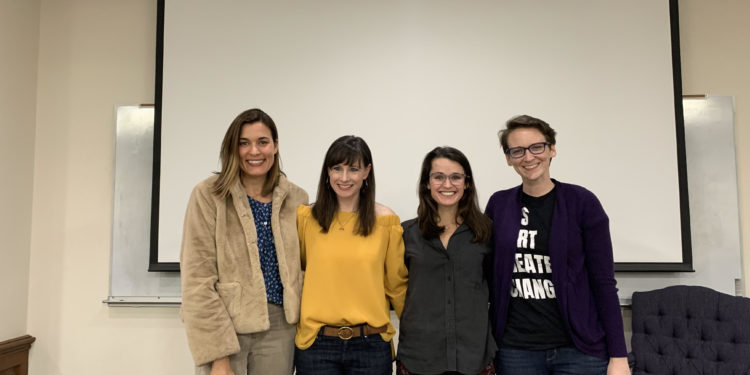Megan Rose Dickey / Contributing Writer
On February 25th, Samford University’s Counseling Services collaborated with the Body Positive Chapter and Panhellenic Council to host a panel to discuss eating disorders and to raise awareness.
The panel consisted of dieticians and therapists from 24/7 care and outpatient counseling centers. Allison Burnett, Alice Churnock, Caroline Hughes and Suzanne Pirkle composed the panel. Burnett and Hughes both work at Alsana, an overnight treatment facility. Churnock and Pirkle work at Covenant, an outpatient counseling center.
The women received questions from the audience, many of whom wanted to know when it is time to get help for a eating disorder or unusual eating habits.
“Rearranging your life around what your body looks like is a red flag,” Churnock said. “Feeling guilty, planning meals obsessively, exercising constantly.”
Pirkle said that it is time to get help when you feel powerless and paralyzed.
All four women said treatmenting a eating disorder includes more than just the nutritional component; it is a coping skill that stems from some other problems, such as insecurity, lack of safety, fear and more.
The panel also discussed the normalized diet culture, in which people try to consciously control their eating by counting calories and skipping meals.
“Conscious eating is based off a perception not fact.” Pirkle said. “Diet culture is a 90-billion dollar industry with a 98% failure rate.”
When people begin to control their diets, they take away their body’s power of identifying hunger and fullness.
“If we try to go to a place where we consciously control our eating, we have taken away the anatomy’s ability to identify those needs for us,” Pirkle said.
The panel also focused on how an individual can know what eating and exercising habits are healthy for them. The panel all had similar but unique opinions about this topic.
Pirkle said he believes it is important to ask your body and observe how it felt after you ate a certain thing or exercised a specific way. Churnock said we have to appreciate the many things our body does for us everyday rather than criticizing it.
“Food can bring about things besides nourishment such as community, joy and experience,” Hughes said.
The panel urged students to see a dietician if they are concerned about their eating habits.
“Go see a dietician if you’re always lacking energy or always hungry or your diet to you just seems abnormal,” Burnett said.
If a student ever needs help, regardless of whether they are suffering from an eating disorder, they should contact Samford’s Counseling Services. The office is located in DBH 203. They also can be reached by email at counseling@samford.edu or at 205-726-4083.






